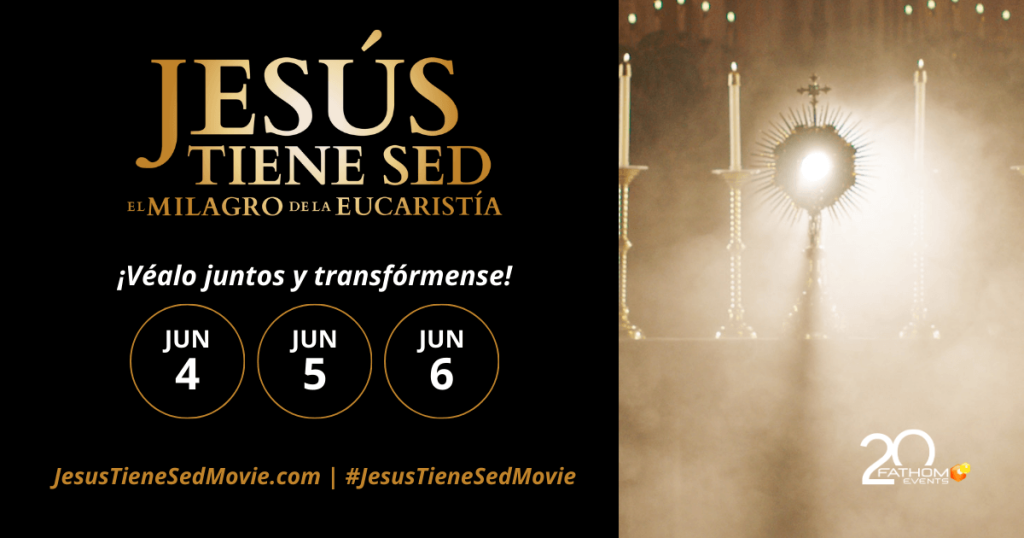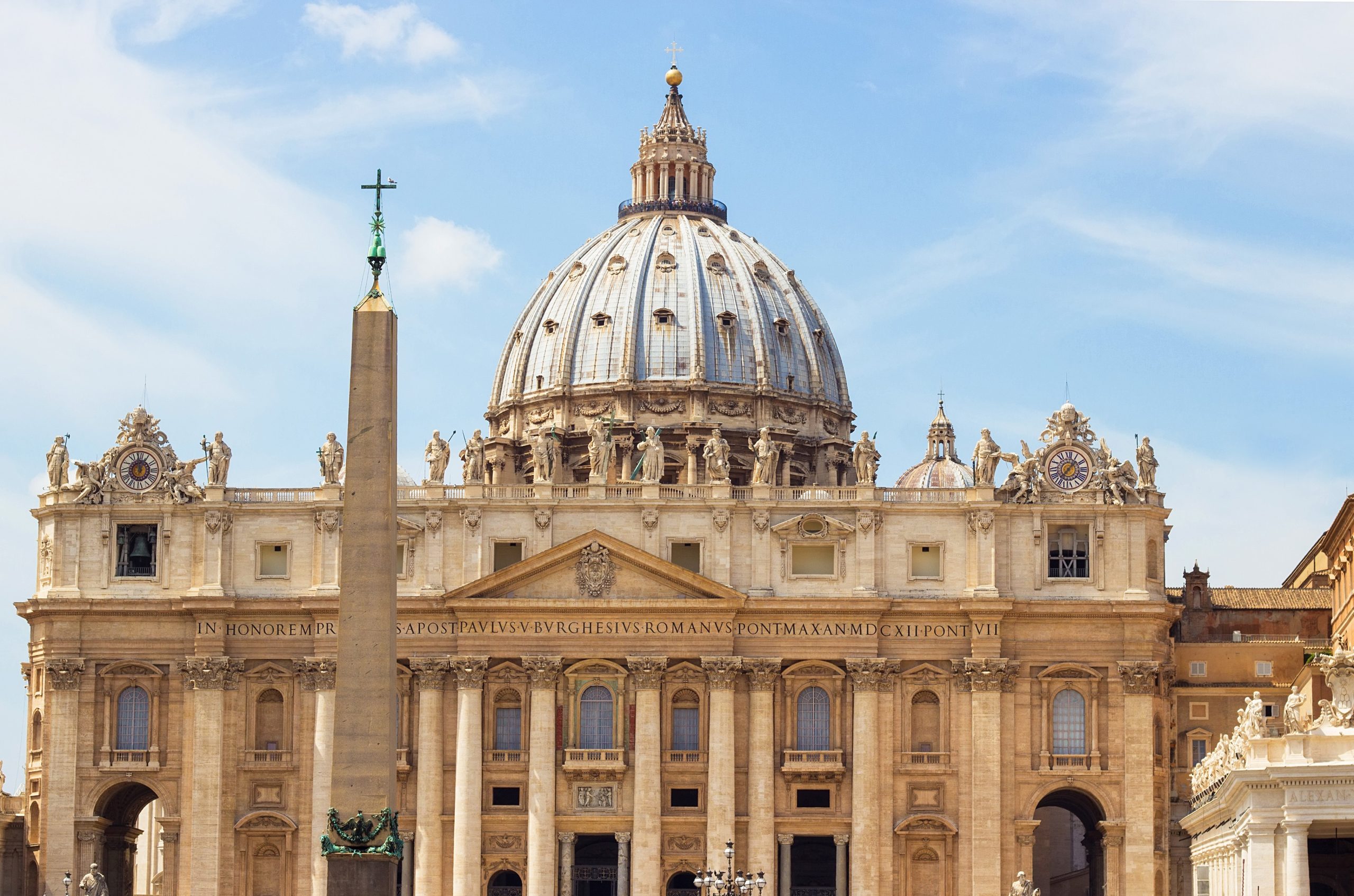‘Jesus Thirsts’ Documentary in theaters puts Eucharist front and center in faith lives
Jean Gonzalez of the Florida Catholic staff
ORLANDO | After the first minute of “Jesus Thirsts: The Miracle of the Eucharist,” viewers witness a stark background with the words of the Gospel of John 6:51: “I am the living bread that came down from heaven; whoever eats this bread will live forever; and the bread that I will give is my flesh for the life of the world.”
It would seem an appropriate beginning of the film that will show in theaters June 4, 5 and 6. In that verse lies the truth of the Eucharist as treasured by the Catholic faith: the true presence of Christ as the bread or host and wine are transformed into Jesus’ flesh and blood. As explained by Bishop Kevin Vann of Orange, Calf., “Jesus Thirsts” is more than a story, but a journey of faith that works to unite the true presence of Christ in the Eucharist. The impetus of the film was the National Eucharistic Revival and was the brainchild of three filmmakers who all share a love for the Catholic Church. This trio of Deacon Steve Greco, James M. Wahlberg, and Tim Moriarty wanted to explore the transformative power and impact of the Eucharist and why it’s the source and summit of the Christian faith.
Deacon Greco, serves as director of evangelization and formation for the Diocese of Orange and founder of Spirit Filled Hearts Ministry, and Walberg, is a national speaker, screenwriter and director who leads Wahl St. productions, served as executive producers. Moriarty of Castletown Media, served as the documentary’s writer and director.


The film moves from the experiential to the pedagogical. At one point, viewers share in the delight in celebrating the Eucharist for people in a rural part of Uganda, and within a U.S. maximum-security prison. They see how some grapes for the wine are harvested in Slovenia and some hosts are baked in Poland. Interspersed with those stories are explanations based on Scripture and Catholic social teachings by scholars and Catholic evangelists familiar to those who have attended Eucharistic conferences – Father Donald Calloway, Chris Stefanick, Father Robert Spitzer, Bishop Andrew Cozzens, Scott Hahn and St. Clare Sister Briege McKenna, an Irish native who has roots serving in Tampa.
Wahlberg is another “Florida connection.” A Fort Lauderdale resident, he spoke with the Florida Catholic about the film, its origins and its mission. Through discussions with Catholic leaders and heartfelt personal narratives, the film unveils the Eucharist as Jesus Christ himself, eagerly desiring to fulfill our spiritual thirst with his boundless love. The goal was to share personal stories of individuals whose lives were transformed by the Blessed Sacrament because Wahlberg believes it is something lost by today’s Catholics.
“We have a big problem in our church where 70 percent don’t believe in the true presence of the Eucharist. We are going to Mass and there are three out of four people who don’t believe that is truly Jesus.”
Just before his phone interview with the Florida Catholic, Wahlberg and his wife spent time in church in the north end of Boston before the Blessed Sacrament. It was in the middle of the day, yet the church was practically empty. That was one reason for the film’s impetus – reviving the love for the Eucharist. And at first, the idea was to focus on Eucharistic miracles, but then Scott Hahn suggested another idea. “He said we should focus on the miracle of the Eucharist instead of Eucharistic miracles, and it was like ‘Yes!’” Wahlberg recalled.
The film explores the lives of Archbishop Fulton Sheen – known as one of the earliest television evangelists – and Cardinal Van Thuan – who was imprisoned in North Vietnam for decades for his faith. Their powerful examples share screen time with everyday Catholics showing their love for the Eucharist, including the prisoners Wahlberg met at the Mark Stiles Unit at a Texas maximum security prison. He accompanied Deacon Thomas Ewing, chaplain for the Texas Department of Criminal Justice and Bishop David Toups of Beaumont, Texas, who served as rector of St. Vincent de Paul Regional Seminary in Boynton Beach before his episcopal appointment. In the film Deacon Ewing speaks about how the prisoners are human who made mistakes but are “growing in Christ” who have a “unique experience in their focus on the Eucharist” because they understand they receive mercy. That is something Wahlberg said was palatable as he celebrated Mass and Adoration with those men.
“We went there just a few days before Christmas. To see the joy in their faces while they were in situation they were in (being incarcerated), it was just beautiful,” Wahlberg recalled. “The men we met there were happier than they had been in all their life, and yet some of them were in prison for life.” Wahlberg understood the experience those prisoners treasure in the Eucharist because he had experienced that himself.
“I think that we are like Mother Teresa who served the forgotten and the discarded of the world. But sometimes we forget the people in the most difficult of situations,” he said. “When I came to know the Lord, I was in prison myself. For me, it was an opportunity for all the noise and craziness of the world to stop. I needed to be in prison. I needed to have that time to stop and settle down and see the graces and the mercies that I had experienced but was not aware of it.”
As the film “Jesus Thirsts” brings the breadth and depth of what Catholics believe about the Most Blessed Sacrament to life through personal faith witness, it also explores what Chris Stefanick described as an “era of the spiritually disembodied.” Wahlberg said this film is a wonderful tool for viewers of all ages and backgrounds to develop a deeper understanding of the Eucharist. The goal is to get “people in the seats” and let the faith stories inspire viewers.
“Documentaries like this must be more than educational. They must hold your attention,” Wahlberg said. “There are stories of people on fire with the Eucharist, stories about Eucharistic miracles you may or may not know about. It was a learning experience for me, and a lot of folks who worked on the film had profound experience going through the process.”
The film that began with Scripture ends with a black-and-white, decades-old installment from Archbishop Sheen. He speaks about how the power of his priesthood and his vocation comes from the daily time he spends with the Eucharist, a time he calls a “divine presence.”
“I tell you it is the sweetest, greatest association in the world,” the late prelate stated so many years ago. “Try it.”





